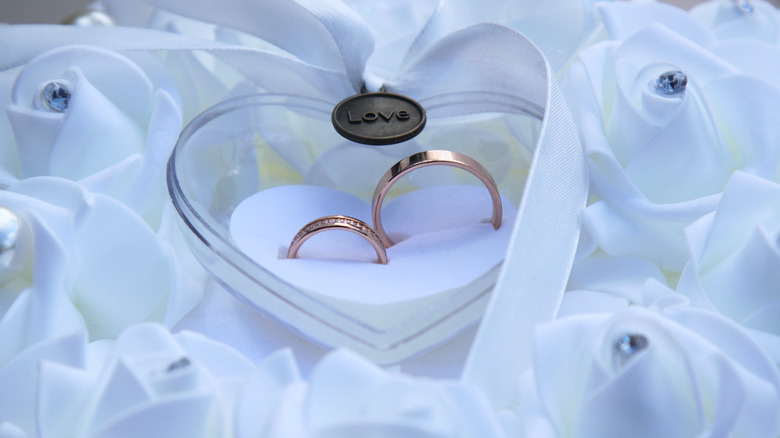The Unsurprising Origin Of The Word Husband
Marriage is one of the oldest traditions humans have. The expectations of a husband and wife might differ from one culture to the next, but the general idea is the same. You pick one person you love, and you spend the rest of your life with them. You can follow guidance on how to be a good spouse from religious texts like the Bible, or use the relationships of your parents or other family members to figure out how to make it work. Or you could figure it all out on your own.
But regardless of where you live and what guidelines you follow, there will probably be a few things in common. For example, if there's a woman involved in the marriage, you'll likely be calling her a wife. If there's a man, he's the husband. Those words are almost as old as the institution of marriage itself, and they tend to mean exactly what you'd think they would.
Master of the house
The etymology for the word wife is pretty straightforward. According to the Online Etymology Dictionary, it's derived from a handful European languages' words for woman. From Scandinavian and Romantic languages use of wif, wifman, or weib, it's easy to see how we got to the word wife. But husband doesn't just come from the word for man. In fact, it's the combination of a couple different words.
The term husband, translated literally, means the man who runs the house (via Online Etymology Dictionary). It doesn't even specify that a man has to be married — he just has to run a home. That's because the word is derived from the Old Norse words hus, or house, and bondi, which means a landowner or dweller, according to the Free Dictionary. Much like how wife came from words describing women regardless of their marital status, husband originally didn't have much to do with marriage. That association came later on.
Bringing marriage into it
Associating husbands and wives with weddings isn't exactly new, even if the etymology of the words comes from somewhere else. They just weren't used together, at least at first. According to the Free Dictionary, husbands usually had a husbonde, which was the "mistress of the house." And the Online Etymology Dictionary says that a wif usually had a wer, or a man. The words wife and husband stuck around, but their counterparts didn't.
You can see the lengthy history of the term husband even in modern usage. Dictionary gives a lengthy list of definitions for the word, ranging from "a married man" to "to till; cultivate." Even the term hubby has a pretty lengthy history. According to the Online Etymology Dictionary, that word has been around since about 1680. Although we might have come together to use the word for one specific purpose, it has a variety of possible uses. It's been around for a while, even though it took some time for English speakers to come to a consensus on how to use it.


